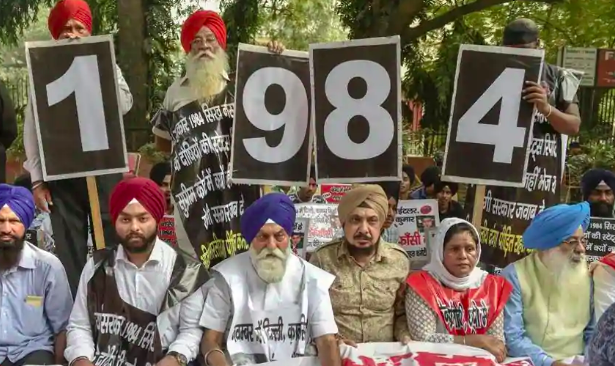Justice Delayed but not Denied
November 23, 2018 | Expert Insights

Almost 34 years after anti-Sikh riots shook Delhi, a city court, in a “rarest-of-rare” judgment on Tuesday, sentenced a 55-year-old man to death and sent another to prison for life after having held them guilty of killing two Sikh youths and other heinous crimes during the 1984 violence.
Background
In the early 1980s, India experienced violence due to the armed Sikh separatist Khalistan movement which sought independence from India, led by Bhindranwale. Bhindranwale was invited to take up residence in Golden Temple Complex to evade arrest, and later on, made the sacred temple complex an armoury and headquarters. In the violent events leading up to the Operation Blue Star, 165 Hindus and Nirankaris, and 39 Sikhs opposed to Bhindranwale were killed. The total number of deaths was 410 in violent incidents and riots while 1,180 people were injured.
Operation Blue Star was an Indian military operation carried out between 1 and 8 June in 1984, ordered by Prime Minister Indira Gandhi to remove militant religious leader Jarnail Singh Bhindranwale and his armed militants from the buildings of the Harmandir Sahib complex in Amritsar, Punjab. Bhindranwale died and militants were removed from the temple complex, but the military action in the temple complex was criticised by Sikhs worldwide who had interpreted it as an assault on the Sikh religion. Four months after the operation, on 31 October 1984, Indira Gandhi was assassinated by her two Sikh bodyguards, Satwant Singh and Beant Singh.
The 1984 Sikh Massacre was a series of organised pogroms against Sikhs in India by anti-Sikh mobs in response to the assassination of Indira Gandhi by her Sikh bodyguards. Official Indian government reports numbered about 2,800 killed across India, including 2,100 in Delhi. Independent sources estimate the number of deaths at about 8,000 including at least 3,000 in Delhi.

Analysis
A court in New Delhi has sentenced to death a man convicted of murder during the 1984 anti-Sikh riots that left nearly 3,000 people dead, following the assassination of Prime Minister Indira Gandhi. The violence, which occurred mostly in the capital New Delhi, lasted three days when Sikhs were assaulted, murdered and burned alive, while their homes and businesses were set on fire.
On November 14, the court had convicted Singh and Sherawat for killing the two men, Hardev Singh and Avtar Singh, two men in their 20s, during the 1984 anti-Sikh riots, the first conviction in the cases reopened by the SIT.
On November 1, 1984, Hardev Singh and two others were at their grocery shops in Mahipalpur when a mob of 800-1,000 armed with iron rods, hockey sticks, stones, kerosene oil attacked them and set their shops on fire. They rushed to their friend Surjeet Singh's home and locked themselves inside. They were later joined by Avtar Singh. The mob followed them to the house and stabbed Hardev before throwing all of them from the balcony. The injured were taken to Safdarjung Hospital where Avatar Singh and Hardev Singh died. The Delhi Police had closed the case in 1994 for lack of evidence.
On 20 November, Additional Sessions Judge Ajay Pandey handed the death sentence to Yashpal Singh and a life sentence to Naresh Sherawat, both for murder, rioting and other charges.
The verdict was pronounced in the high-security Tihar Jail due to security concerns after the convicts were attacked on a New Delhi court's premises last week.
This is the first time a convict has been handed the death sentence in the 1984 anti-Sikh riots after the cases were reopened by the SIT in 2015. Both convicts have also been fined with Rs 35 lakh each.
Punjab Chief Minister Captain Amarinder Singh welcomed the verdict and said justice was finally served in the case.
Yashpal Singh's death punishment in the anti-Sikh riots is the first since 1996 when Kishori Lal, a butcher, was sentenced to death in at least five cases by lower courts. The Supreme Court later commuted it to life term. Sherawat worked at the Mahipalpur post office while Yashpal Singh was a transporter. The verdict has given "Sikhs a ray of hope", said Union minister Harsimrat Kaur Badal.
Assessment
Our assessment is that the Supreme Court’s efforts to convict those guilty of inciting and carrying out violence during the 1984 pogroms will play an important role in ending the impunity granted to perpetrators of hate crimes across the country. We believe that the non-partisan stand taken by the court sets a positive precedent, and could contribute to replacing polarisation and divisiveness with unity and justice.








Comments